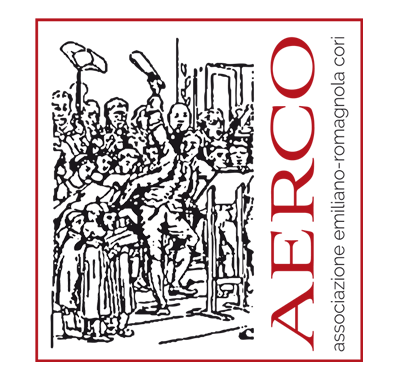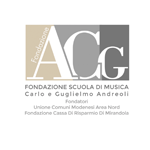Fifth International Competition
for Children’s Choir Composition
CORINFESTA
1.The Associazione Emiliano Romagnola Cori (A.E.R.CO.), together with the Fondazione C.G. Andreoli of the ‘Unione dei Comuni dell’Area Nord di Modena’, with financial support of the Ministry of Culture and of the Region Emilia-Romagna and with the patronage of FENIARCO, announces the Fifth International Composition Competition for Children’s and Youth Choirs CORINFESTA with the aim of creating new material to be widely disseminated.
2. Participation is open to composers of any nationality.
3. The competition is divided into two sections:
Section A: Towards Polyphony
a. two voices (SS or SA), no divisi;
b. a cappella or with piano accompaniment and possible small and/or body percussion;
c. of a maximum duration of 3 minutes;
d. the text chosen may be sacred or secular, in Italian (also dialectal) or English or Latin, enclosing the Italian translation; if secular, it must be suitable for the age of the singers to whom this Section refers. It will also be possible to choose one of the texts suggested in the paragraph ‘good texts for good music‘ (*).
e. the difficulty and general approach of the piece must take into account the pedagogical context of a children’s choir;
f. it is desirable to use tools for the inclusion of diversities and disabilities (Sign Languages, soundtracks, …). It will be the composer’s responsibility to illustrate the choices made by means of a dotted or synthetic-discursive legend.
Section B: Many voices, a school of life
a. three voices (SSA or SAT or SABr), no divisi;
b. a cappella or with piano accompaniment and possible small and/or body percussion;
c. of a maximum duration of 5 minutes;
d. the text chosen may be sacred or secular, in Italian (also dialectal) or English or Latin, enclosing the Italian translation; if secular, it must be suitable for the age of the singers to whom this Section refers. It will also be possible to choose one of the texts suggested in the paragraph ‘good texts for good music‘ (*).
e. it is desirable to use tools for the inclusion of diversity and disabilities (Sign Languages, soundtracks, …). It will be the composer’s responsibility to illustrate the choices made with a dotted or synthetic-discursive legend.
4. Each candidate may submit a maximum of two entries (one for each section or two for a single section). Submissions shall be made exclusively via the appropriate online form by and no later than midnight on 30/06/2023.
5. The participation fee is 30 euros per entry.
6. Each work must be sent in PDF format. The composer’s name must not appear on the score. The AERCO office shall receive the scores and send them to the members of the jury. The identity of the composers will not be disclosed by the AERCO office until after the evaluation phase has been completed. The online form shall also contain the following information: a. personal details (name, surname, address, telephone number, e-mail address); b. curriculum vitae; c. a declaration that the pieces submitted have never been published and/or awarded; d. source of the literary text, if any; e. permission to use and publish any protected literary texts from the author or publisher or rights holder; f. performance notes, if any; g. mp3 file obtained from the MIDI of the score.
7. The jury shall consist of five members who are composers and choir directors. They are: John Rutter (UK), Tullio Visioli (Italy), Tim Sharp (USA), Daniela Nasti, (Italy), Chris Artley (New Zealand). The judgement will be final and unappealable.
8. The evaluation criteria will be: a. quality of the textual treatment; b. overall artistic impression; c. performability: compositional attention to vocal and perceptual requirements.
9. The following prizes will be awarded:
First Prize Winners (one per Section)
– cash prize of € 1,500 (one thousand five hundred euros);
– public and multimedia performance, within 8 months from the announcement of the winners, by the ‘Cincinnati Youth Choir’ (USA) for Section A and by the ‘Crystal Children’s Choir’ (USA) for Section B;
– the winners will be ‘composer in residence’ for AERCO throughout 2024. AERCO will select 4 choirs (primarily from among its members), who will have the opportunity to commission the winners with a piece dedicated to their choir. AERCO will pay the winning composers a sum of EUR 500 per commission.
– The winners will be ex officio jury members of the 2025 edition;
– publication, with the permission of the authors, by a major publishing house or by AERCO;
– diploma.
Runners-up (one per Section)
– cash prize of 600 euros (six hundred euros);
– public and multimedia performance, within 8 months of the announcement of the winners, by an important Italian or foreigner choir for Sections A and B;
– publication, with the permission of the authors, by a major publishing house or by AERCO;
– diploma.
Third classified (one for each Section)
– publication, with the permission of the authors, by a major publishing house or by AERCO;
– diploma.
For all submitted scores
– All the pieces entered in the competition, except those chosen for publication with a publishing house or with AERCO, if authorised by the composers, will be published on the www.corinfesta.it website for choirs to use as new repertoire; they will also constitute repertoire to be used for the special category of the ‘Concorso Corale Nazionale Città di Riccione’ (www.coroallegrenote.it).
10. The jury reserves the right to indicate other compositions in addition to the winners, as well as the two (one for each Section) with the best treatment of inclusion strategies and the two (*) (one for each Section) with the best use of suggested texts. The composers of the shortlisted pieces will receive a certificate of mention.
11. Participation in the competition implies full acceptance of these rules.
(*) Special Mention: Good Lyrics For Good Music
The Artistic Direction has selected seven poetic compositions in order to highlight to the composers the importance of choosing ‘good texts for good music’. To get in touch with the authors of the texts, write to aercobologna@gmail.com.
1.I brutti sogni (Patrizia Longobardi)
2.L’uomo e l’acqua (Elisa Gastaldon)
3.Il Piccolo Sutra del Fiocco di Neve (Alfonso Ottobre)
4.La storia più bella (Elio Pecora)
5.Grano d’oro (Franca Renzini)
e guarda bene: la camomilla!
7.Carefree Grass (Emily Dickinson)


